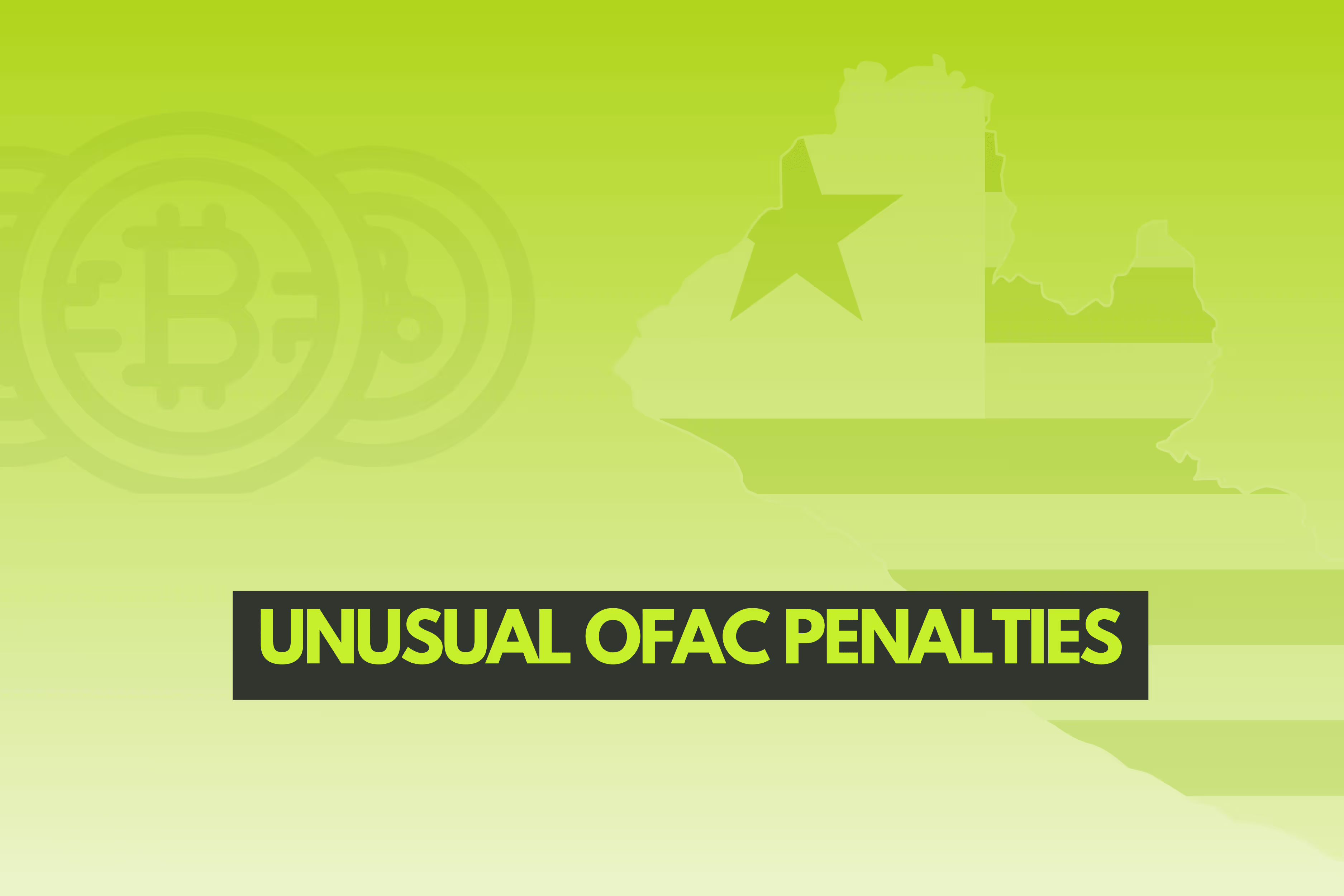
Unusual OFAC Penalties: Lessons for Compliance Pros
OFAC is the US's sanctions enforcer and has issued numerous multimillion-dollar penalties over the years. But like any set of data, anomalies exist. This report by sanctions.io unveils some of the most unusual cases. Why? They are highly engaging. But more importantly, they offer learning points to compliance professionals.
A Brief OFAC Penalties Overview
The Office of Foreign Assets Control (OFAC) was created in 1950. The reason? During the Korean War, President Truman sanctioned Chinese and North Korean assets subject to US jurisdiction.
But this isn't a history lesson. The point is that for almost 75 years, OFAC has been enforcing sanctions laws to support US foreign policy and national security objectives.
OFAC is part of the US Treasury, and on its website, it publishes an easy-to-use database of enforcement actions since 2003. It's a fantastic resource, with links to PDF reports published at the time enforcement actions were publicly released.
It's also the resource sanctions.io used to unearth unusual OFAC penalties since 2003. Without further ado, let's reveal them.
1. CSE Global (2017)
CSE Global is a Singapore-based technology company mainly operating in the industrial and manufacturing sectors. In 2017, OFAC slapped a whopping $12 million penalty for Iranian sanctions violations.
But what made the case so unusual?
At the time, this was the first time OFAC penalized a non-financial institution outside the US that settled a transaction with a sanctioned country in US dollars. In a nutshell, OFAC asserted broader jurisdictional reach over non-US entities engaging in transactions without direct contact with the US (other than making payments in US dollars).
Lesson learned
If your company performs transactions in US dollars, regardless of where you are on the planet, it needs to screen customers and business partners against OFAC sanctions lists.
Need help? sanctions.io is a cost-effective, reliable, and easy-to-setup sanctions screening provider. Learn more here.
2. 'An Individual' (2020)
The next unusual OFAC penalty takes us through the Darién Gap and all the way to Bogota, Colombia. So what happened? In 2020, OFAC revealed it had penalized an individual (a US citizen) for engaging in at least 24 transactions for the benefit of a foreign individual, who at the time, was a specially designated narcotics trafficker.
The individual who is not named - perhaps because they were a civilian direct hire of the US Army stationed at the US embassy in Bogota - received a $5000 fine (and one can assume damages to their reputation and career).
But what makes this case so unusual?
The most striking aspect is the penalty's monetary value - one of the smallest in OFAC's history. Also, it's rare for OFAC not to name the defendants in its cases.
Lesson learned
There is often confusion about who needs to comply with sanctions laws. As anti-money laundering (AML) laws do not apply to everyone, sanctions laws are often bundled into the same category as AML and slip through the cracks.
Unlike AML regulations, all businesses, organizations, and individuals (including you and me) have the same legal responsibility not to break sanctions laws.
3. Richland Trace Homeowners Association (2012)
Our next unusual sanctions penalty takes us to Texas with a stop in the West African country of Liberia. Here's what happened: In 2012, OFAC penalized a Dallas-based homeowners association $9,000 for violating the Former Liberian Regime of Charles Taylor Sanctions Regulations.
Charles Taylor ruled Liberia between 1997-2003 and is now serving 50 years in prison after courts found him guilty of "aiding and abetting as well as planning some of the most heinous and brutal crimes in recorded human history."
I'm sure you are now wondering how a Texas homeowners association found itself embroiled in this odd legal quagmire.
In a nutshell, a Liberian national appearing on OFAC's Specially Designated Nationals And Blocked Persons List (SDN) list owned a condo that was part of the homeowners association. According to OFAC, banned economic activity occurred and dished out the penalty.
You can learn more about this peculiar case here.
Lesson learned
Companies must conduct thorough due diligence on individuals or entities they engage with, especially when those individuals have connections to sanctioned countries or individuals listed on government watchlists. Although the penalty's monetary value was small, the organization undoubtedly suffered tremendous reputational damage.
In 2024, the US Treasury's National Money Laundering Risk Assessment revealed that the Financial Crimes Enforcement Network, FinCEN, is drafting regulations to address money laundering vulnerabilities in the residential real estate sector.
If this goes ahead, and it probably will, sanctions list screening (which helps in AML and sanctions compliance) will likely be a legal requirement.
4. Bittrex (2022)
The fourth unusual OFAC penalty that compliance professionals can learn from comes from the crypto world. But here's the thing: In 2024, an OFAC sanctions penalty against a crypto firm isn't unusual.
Just ask Binance. At the end of 2023, OFAC distributed an enforcement release stating that it had settled with Binance for almost $1 billion for apparent violations of multiple sanctions programs (the specific amount is $968,618,825).
However, back in 2022, up until October of that year, OFAC had yet to penalize a cryptocurrency company. Which company has the unenviable blot on its record as the first? That would be Bittrex.
On October 11, 2022, OFAC announced an enforcement action and $29 million settlement with Bittrex, a Washington-based cryptocurrency trading platform, for apparent violations of multiple sanctions programs, including those prohibiting US companies from doing business with:
- Iran
- Sudan
- Syria
- Cuba
- The Crimea region of Ukraine
Lesson learned
At the time of the sanctions violations (2014-2018), Bittrex was a small startup operating in what can be described as the "wild west years" of the nascent cryptocurrency industry. However, eight years after the first violation, it faced multimillion-dollar penalties and tremendous reputational damage.
All companies must prioritize sanctions compliance from the outset, even if they are small or operating in emerging sectors.
Recommended reading: Startups & SMEs Must Pay Attention to Sanctions Violations Too
Final Thoughts & How sanctions.io Supports OFAC Sanctions Compliance
So there you have it. Four OFAC penalties that are all unusual for one reason or another. But importantly for compliance officers with sanctions in their remit, all of today's cases also provide tangible learning points.
Curious to know how we can support your business with sanctions compliance?
sanctions.io is a highly reliable and cost-effective solution for AML and sanctions screening. AI-powered and with an enterprise-grade API with 99.99% uptime are reasons why customers globally trust us with their sanctions screening needs. To learn more:
We also encourage you to take advantage of our free 7-day trial (no credit card is required).



